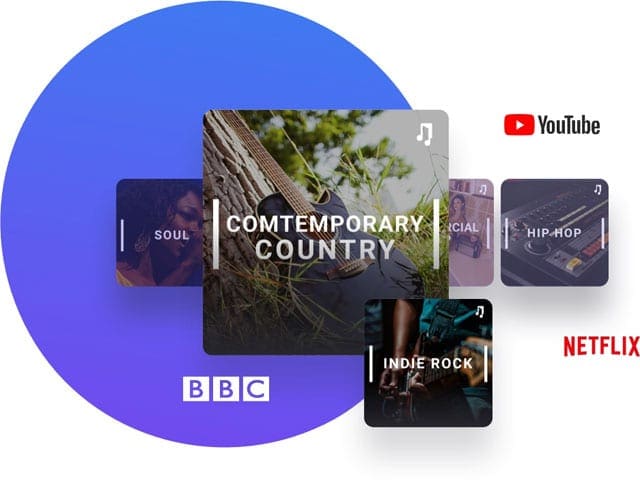Who Are Record Labels & Record Companies?
Record labels, the traditional holy grail of the music industry. For artists, signing a record deal was like winning a golden ticket, the key to success and proof that you’d “made it”. Traditionally record labels were these huge, pop-producing powerhouses that took unknown performers, made them over and presented them on Top of the Pops.
Over the past 50 years, however, with the rise of subcultural movements and the emergence of new genres, there’s been a shift. Thus began the age of the indie label, whose artists signified cultural change, creative freedom and underdogs.
But now we’re entering into again another shift, the digital age has enabled unsigned artists to market themselves and connect with their fans through freely-accessible platforms like Youtube, Soundcloud and social media. Record labels of all sizes are having to rethink their approach to music production and promotion in order to stay ahead, especially when record sales are drastically falling.
So who are record labels and what do they do? What can they do for you as an artist that you can’t do independently? Read ahead as we’re going to examine every element of a record label, major and independent.
What Do Record Labels Do?
Record labels are responsible for marketing music and music videos by artists signed to their label to encourage sales. They are often also music publishers, and therefore must protect the copyrights of their artists, and act as distributors. Record labels often operate as groups, with sub-labels being owned by a parent company.
There are many functions and job roles in a record company. Traditionally they scout new talent and give them the direction and tools to turn them into recording artists, as well as developing their skills and aiding publicity to ensure they continue to grow in their careers. Record labels, dependent upon the nature of the contract, take a lot of the legal responsibilities away from an artist so they can focus on their music and performing.
The breadth of a record label’s resources is largely dependent upon their status as a major label, or and an independent.
Major vs Independent Record Labels
What differentiates major and indie labels? Well, a major label is defined by its high proportion of the market share in the music industry and an independent one operates without the financial backing of major labels. There are three majors who have dominated the market for years and who remained the top record labels in 2018; the Universal Music Group, Sony BMG and Warner Music Group. In 2017, independents saw a huge rise in their combined market share, accounting for 29.88% of the sector collectively.
Majors
The majors are the old dogs of the business; they have huge, global networks and resources, as well as significant financial power to help promote their artists. Major record labels have been responsible for the success of some of the biggest recording artists in history such as Whitney Housten and Micheal Jackson.
Majors are driven by commercial success and channel their artists towards popular music for the mass market. Their reputations and history of successful artists mean they hold influence within the music industry, doors are open to acts under the wing of major labels and opportunities to work with them are highly sought after. Big artists can be desirable for promotional purposes for fashion designers and consumer products alike, as they are branded style icons and are in the public eye.
Major record labels have huge teams to back their artists and manage a lot of the business elements of music making. Typically they will have top managers, producers, songwriters, session musicians, publicists, stylists, photographers, radio pluggers and more behind an artist to ensure their success and mass public reach. As their goal is to produce high-selling, popular artists, they market their acts in a way they feel will connect with contemporary popular culture.
There are downsides to being signed by a major record label, however. To appeal to the mass market, the artist typically has little control over their art, instead of recording the work of songwriters and producers with proven ability to write number-one tracks. Unless the artist is known for having incredible songwriting skills, it’s likely someone else will be responsible for the composition of their songs. Even Adele, one of the most celebrated songwriters of the 21st century, collaborated with top producers and songwriters when writing her best-selling album 21.
Typically artists are given an advance to live by the label on whilst they are recording an album. Upon release of this, the advance must be paid back to the label in the form of sales and royalty payments. The artist won’t see any income from their music until their advance has been paid off. If an artist fails to sell enough records then they are in the debt of the label. There have been many a tale throughout the history of the music industry of artists being swindled by record companies who take a large proportion of the revenue generated by the artist’s success. Claims to the copyright of compositions, shares of publishing rights and fees of managers, publicists and legal departments all add up, often leaving the artist with little income unless they reach great success.
The reason the three majors labels dominate the industry as vastly as they do is that they own, or part-own, a number of sub-labels and subsidiaries. For example, the Universal Music Group owns record labels all over the world, contributing to a net worth of $22 billion in 2017.
Independents (Indies)
The alternative to a major label is an independent one. Independents rose to fame and success towards the end of the 1970s with the subculture movements of punk, new wave, indie rock and grunge. They have always been closely tied to cutting-edge music scenes and cultural movements.
In the 80s, the biggest independent record labels were often run by mavericks with no regard for the traditional conventions of the industry, but simply a love of good music and a desire to help promote it. Indie records produced some of the most iconic rock bands in history, such as Nirvana, Joy Division and The Smiths.
Independent labels have reputations for offering more nurturing environments for their artists; focusing on development, their art and career longevity. Independent labels may not have the same financial backing or the vast expanse of resources that the majors do, but this doesn’t stop them from producing commercially successful artists, such as the Arctic Monkeys at Domino Records.
Independent labels are often formed in a response to the underrepresentation of a musical genre. As majors sign artists whose music fits within the realm of popular music, independents sign those who don’t. Some music scenes aren’t motivated by commercial success, but a preservation of their art. Independent labels can be much more niche in the rosters.
Independent record labels have traditionally responded more effectively to cultural movements and changes to the industry than majors. Without such restrictive structures or traditional conventions as the majors, they adapt more effectively to changing times. The digital era, for example, it suddenly allowed independent artists to engage with their fans and promote their music for free, levelling the playing field between them and the majors. Thanks to the everyday use of the internet and social media by millions across the planet, independent labels have been able to compete with majors like never before.
No matter the scale of a record label, or their approach to music promotion, traditional roles will exist within the company. For independents, the roles may be slightly blurred and staff taking on more than one role within their operations.
Managers
Each band signed to a record label will generally have a manager. If it’s an independent label with a small team, the team may collectively act as the band’s management. A manager’s role is to guide the artist through their career in music, advising them on recording contracts, business decisions, press and touring. Depending on the scale of the band’s success and their wider team, a managers role could encompass more responsibilities or less.
The manager should always have the best interests of the artist at heart. They should manage their act carefully to ensure long and successful careers. For emerging acts, managers can sometimes feel like an unofficial extra member, there for every step of the creative process and stimulating good relationships with their fans.
A manager will generally oversee the business side of music making, allowing the band to concentrate on the music. Managers should help their artists get in the room with record labels, producers, members of the press and other influential players who could assist in the advancement of their careers.
Artists and their management often form close relationships after long hours of working together and through successes in their careers. Managers can be more of a friend than an employee and sometimes offer personal advice as well as business, to ensure the wellbeing of the artist.
In return for their services, managers generally take a cut of the band’s revenue as payment for their services. As an artist becomes more successful and brings in more revenue, the manager’s income should increase too.
A&R
This is the team responsible for finding new talent and nurturing its development. A&R stands for ‘artists and repertoire’ and is a key department within labels. The role itself of A&Rs has drastically changed however due to the internet. Once upon a time, playing shows was the only way bands and artists could engage with their fans and widen their fan bases. Record labels looking for artists would send out their A&R teams to local shows and venues looking for potential stars. If you were picked up by an A&R rep and signed, then you could really start to generate interest and sell records. The acquisition of new talent was vitally important to the success of record companies.
The internet has broken down the barriers between musicians and fans, making it easier than ever to find talent. Fewer acts are being signed to labels now and A&Rs have had to adapt to survive. A&R departments are now smaller and jobs can comprise of more responsibilities as the role evolves to compete within the digital era. It’s commonplace for A&Rs to work independently whilst also working other roles within the industry and to carry the band further than they would traditionally.
Promotion
This is where record labels have traditionally made careers. It’s not enough to produce good music if no one’s going to hear it, it must be marketed and promoted correctly to generate revenue. This can involve multiple teams and where a major labels wealth and resources can really come in handy.
Teams of marketers will produce artwork, merchandise and advertising material to promote your music in a way that’s reflective of your musical persona or identity, curated by your management team. Then it’s down to promotional teams to push your music onto online streaming playlists, radio playlists and put your name forward for festival lineups and support gigs. Next, it’s down to sales representatives who lobby for retailers to supply your records. There’s no use going to all the effort of promoting your music and getting you on the radio if no one can purchase your music.
Music promotion is not only vital when releasing records, but when going on tour it has to be marketed if you want to sell any tickets. Touring is expensive and as an artist, or artist’s management, you have to be sure it’s going to be financially lucrative. Promotion is essential in the cities along the touring schedule, often a local promoter will be employed externally to the label to help increase ticket sales.
The internet has, of course, changed the way music is promoted in the 21st century. It’s now more cost effective to promote shows with weekly, local ads on Facebook than to advertise tour schedules in magazines. Independent labels can coach their artists on how to effectively use social media channels to maintain a marketable image and engage with their fans. Within an age of vast sharing of information, promoting music can be cost-effective, targeted and highly effective.
Independents have made effective use of the power of the internet when it comes to music promotion, saving their precious funds for other business elements. Majors have been slower to respond to the popularity of digital media and are suffering for it.
Publicity
Publicity is an element of promotion. Publicity involves getting the press and public talking about your product, ie your music, by placing it somewhere it can generate conversation. For example, getting a review of your album in a magazine is publicity because someone is talking about it, getting an advert in a magazine is promotion.
Publicity is vital as it’s not enough to just get your music showing up on people’s timelines if no one knows anything about it or what it sounds like. Think about it, you’re more likely to see a film at the cinema if it’s got really good reviews from critics, that’s publicity.
Publicity can be generated through interviews and reviews in magazines, on the radio, on blogs, in videos or any other digital content. In-store signings, live sessions in record stores or pop up performances can be great as well, as it gives your audience a more unique and intimate experience with your music and can broaden your exposure.
One of the most effective publicity tools that have not changed over time is word of mouth. Fans recommending music to their friends is how many of us find out about new artists, especially as the recommendations come from trusted sources. Now thanks to the internet, the vast sharing of content by fans has meant this form of promotion can reach even more people and span across the world.
If you’re signed to a major label, your promotional team will work to gain publicity for your music. Independents may employ a PR company to assist in this if they haven’t the staff or feel the external expertise would be beneficial to the artist. If your label is a small one, you can discuss with them potential publicity ideas and even implement some of them yourselves.
Artist Development
This is another area that has changed within the music industry, as a lot more is expected of artists before they even sign a record deal. The rise of DIY artists has shown just how effectively musicians can handle their own business decisions. Artists looking for recording contracts nowadays are expected to have established a brand and generated a solid fan base before they can be considered for record deals. Major labels are having to reconsider their approach to sourcing new talent and some departments are struggling to keep up with the changes in the recording industry.
Traditionally, artist development involved focusing and perfecting an artist’s skills. It meant constant practice, business coaching, more time in the studio and growing your audience. It was all about ensuring your career had longevity. It used to be driven by departments of labels but now it’s largely down to the artist.
For independent labels, this hasn’t changed their methods too drastically as they have always offered more nurturing approaches to their artists and want to see them progress. With major labels now, the focus is on ‘product development’ rather than artist development. As they’re challenged by indie labels and independent artists, their focus is on record sales and revenue. They want music that is successful commercially, so the focus is more on the product rather than the one making it.
Whether you’re a signed artist or not, this area of your musical development will largely be your responsibility. If you’re set on having a successful and fulfilling music career, then your personal drive should motivate you to perfect your skills and keep advancing in your career. If you want it, work hard and fight for it.
Sales & Distribution
It’s no secret that record sales have been falling for years now, 1999 is said to be the peak year for global record sales but have been falling ever since. With the introduction of streaming services and internet radio now, however, they are plummeting further still. Sales can include any kind of merchandise; albums, singles, music videos and merchandise. The decline in record sales, costing musicians their traditional income, has meant that recording artists now rely heavily on touring and other merchandise sales to generate their income.
Record labels will take care of the distribution of your music for you, whether you decide to do so solely online or physically as well. Distribution isn’t just CDs in stores anymore, it also means getting your music on every online streaming/radio service you can, making your music available everywhere. Distribution is correspondent to sales, you’re not going to sell your music if no one can access it. That being said, you have to be realistic and think carefully about where you place your music and if it’s cost-effective to print CDs and vinyl.
Major labels have whole departments dedicated to sales, pushing for records to be sold by retailers and checking up on their accounts. As majors generally have long-standing relationships with manufacturers and distributors, or even their own distribution company, this area is managed by the label. Indie labels don’t have the resources available to do this, but may instead have a deal with an independent distributor to place their artist’s records in stores and online across the globe. Depending on the size of your label as an independent, the artist may be more or less involved in this process.
Legal
As many of you surely know, there’s a lot of legal work that goes into releasing music to do with rights agreements. It can be difficult to get your head around and difficult to protect. When you’re signed to a label this is one area they should be able to assist you in or even take off your hands altogether.
Majors will completely take this off their artists hands, ensuring all deserving royalties are paid and work is registered with all the relevant performing rights bodies globally, as well as intervening when the artist’s copyright is threatened. When playing shows, discussing promotional deals and dividing compositional, master and publishing rights, their legal team will be there to arrange and oversee proceedings.
Independents can operate differently depending on their size and resources within their team. They might have a legal department or employ a solicitor to manage their legal work. Whatever the case, if there’s a legal issue regarding your music, your label will be there to support, advise and back you up. If you have taken the independent route, it always pays to be aware of music business intricacies and a basic understanding of copyright law.
Record Label Disputes
Sometimes, more commonly with major labels than with independents, legal disputes can erupt and catch the public eye. One of the most famous disputes of the last 50 years is, of course, Prince and Warner Bros.
After feeling the constraints of his label in regard to releasing music when he wanted and outside of the standard recording/releasing cycle, Prince legally changed his name to an unpronounceable symbol to escape his recording contract. He was then referred to as ‘The Artist Formerly Known As Prince’ and his record sales suffered for it. He did, however, go on to release more music independently and was a pioneer for releasing music via online services.
He famously compared recording contracts to “slavery”, fuelling the reputation of controlling and rigid mechanisms used by major labels such as Island Records, Atlantic Records and Universal Music.
360 Deals: Be Warned
One of the latest back-breaking deals facing artists today is 360 deals. These are a direct result of the decline or record sales and an attempt by record labels to tap into every element of an artists revenue and success in order to make money.
Before the plummeting of record sales, it was standard practice that record labels would pay their artists’ small royalties for the commercial success of their records, however, the artist would retain the revenue generated from touring, merchandise, endorsements and other activities within the entertainment industry. Since the decline in sales however and the low-return from online streaming services, record labels are pushing for 360 deals in order to monetise on other elements that would usually belong to the artist. Labels argue that without their assistance and marketing, the artist would not benefit from these extra branches of income.
In some cases, this logic seems fair. When labels have put up considerable advances for musicians, placing them with top producers and cultivating their brand, it makes sense but can be negotiated to protect the interests of the artist. However, a number of labels, publishing companies etc, are demanding compliance with these kinds of deals, having done nothing in the way of production, promotion or financial backing.
If you get to stage in your career where a record deal is being discussed, make sure you seek legal advice to ensure you’re not swindled out of your rights and the rewards of all of your hard work. Make sure you understand exactly what kind of deal you’re entering into, and what that deal, that company, is going to do to advance your career. It’s easier than ever now to release music independently and there are so many other labels out there. Really consider if this is the best deal for you and how can it work in your favour.
FAQ Section
Q: What does a CEO of a record label do?
A music executive or record executive (CEO) is a person within a record label who works in senior management, making executive decisions over the record label’ (company) decisions. These decisions will affect the artists signed to the label, as in many cases, these decisions will affect the resource, and direction of the company. There can only be one CEO per company, supported by music executives working across the various departments, both in larger independent record labels and major record labels, such as Universal Music Group, Sony Music Entertainment, Warner Music Group and BMG.
Q: How much does it cost to trademark a record label?
If you want to file for a trademark for your brand name or logo, you can fill out a trademark application online with the US Patent and Trademark Office or online in the UK and Europe.. The cost of the application fee is between $275 and $325 in the US and £250 upwards in the UK.
Q: What do labels do for artists?
Record labels are specifically designed to acquire the master rights of recordings and or pay for the recordings and music videos of their artists and label roster. This investment and financial funding are normally recoupable against sales and other revenue aligned to each artist. It’s common for larger companies to also have a music publishing arm of the business, which can be offered as part of a signing deal, but that can have its pros and cons. A record label is responsible for coordinating the production, manufacture, distribution, marketing, promotion, and enforcement of the recording master copyright and music videos, as well as also conducting A&R to talent scout and develop new artists to sign.
Q: What are Independent Record Labels
Independent record labels are small companies called indie or boutique labels. They are generally not affiliated with or funded by any of the major records labels, such as Universal Music Group, Sony, Warners or BMG. Indie labels tend to work with other indie companies for distribution and music publishing. A lot of artists and bands consider boutique and indie labels as more artist-friendly and tend to have a more focused, smaller roster, a bit like a family, whereas if you were signed to Sony, for example, you can be a small cog in a huge artist wheel. Two of the largest independent labels is Beggers Group (Adele) and PIAS.
Q: What are major record labels?
Major record labels also known as just majors are large international corporations that often operate under the control of a corporate umbrella called a music group. They operate their own music distribution services and music publishing companies within the business. Major record labels have good levels of resource across the depts and access to high levels of funded. For major artists, they invest big financial budgets for marketing, production, touring, and overall promotion of their acts. They also have a long-lasting network of established connections and influence in the music industry, backed up by hit legacy recordings and copyrights they own.
There are currently three major record labels, Universal Music Group, Sony Music Entertainment, and Warner Music Group but many consider BMG as the fourth. The majors invest and own a lot of sub-labels and brands.
Q: What are the positions in a record label?
Here is a list of record label job titles and descriptions
- Music executive – A record label’s executive positions include president, vice president and director
- Artist and Repertoire (A&R) is the department that discovers and signs new talent and works creatively with the signed artists on the roster
- Label Manager – Who is responsible for the overall general operations of the business. For smaller indie labels, the manager could well where may hats including, sales, marketing, A&R, legal and design.
- Public Relations (PR) is responsible for acquiring press and media coverage on the artist’s activities, releases and news
- Marketing & promotions manager who is responsible for all aspects of promoting the label’s releases, which may include radio promotion, social media, streaming and advertising
- Designer – this is normally outsourced, however, larger companies will have in-house graphic designers
- Head of legal – responsible for all things legal-based, including signing, licensing deals and long-form contracts
- Sales – responsible for all aspects of exploiting the records
Q: How much does it cost to start a record label?
It doesn’t cost a huge amount to set up a record label, however, it does cost money to run a label successfully, to enable artists to trust the company enough to sign their recording rights to them. Starting a small scale record label, simply require you to set up a standard company, brand and name. You will need to create a business plan, which outlines what you will do for your artists, including distribution, sales, promotions, marketing and funding of the artist’s recordings (advances).
Work out who is going to run the label is this yourself, how will you live before any revenue is generated. A lot of labels start from a base point of a recording studio, so that reduces any costs of advances and recording the music, this could be part of your business plan, as an example in the states, you could expect to require twenty thousand dollars to fifty thousand dollars ($10,000 to $50,000) to get the ball rolling properly.
Q: Does a record label need a business license?
You can run a record label from your own home, and as self-employed or sole trader basis. However, most people would create a limited company, which offers protection to its owners, but it’s not mandatory.
It’s best to seek legal advice from a lawyer, attorney or accountant to determine the right structure for your business.
























